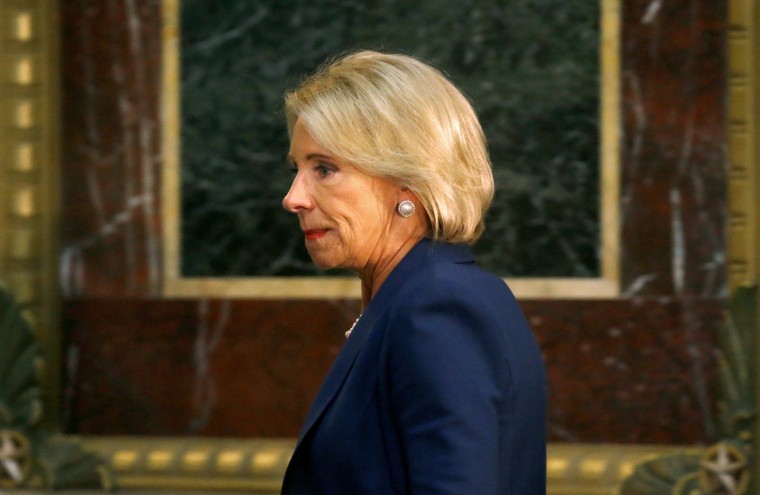Education Secretary Betsy DeVos' proposal to rewrite how universities handle complaints of sexual assault and misconduct had already sparked strong rhetoric from assault survivors and civil liberties groups when she first announced an overhaul in 2017.
With the conclusion Wednesday of a 60-day public comment period, the Federal Register noted that almost 103,000 letters and messages were logged online — revealing just how passionate people remain on either side of the debate.
An official with the American Council on Education, higher education's biggest lobbying arm, estimated the volume of submissions would total 20 times what is typically received for a major regulatory proposal, according to The Washington Post.
Most of the comments appear to oppose the Department of Education's reworking of the federal guidelines known as Title IX, which prohibit gender discrimination, including sexual assault, on college campuses as well as in primary and secondary schools.
"I was a victim of campus sexual harassment," one person wrote. "It is clear the proposed rules would not protect students from sexual harassment."
DeVos — who's been a lightning rod for her controversial positions, including supporting schools that choose to report undocumented students and the federal funding of guns for staff in schools — received the brunt of personal attacks.
"F--k you, Betsy," someone wrote. "You are a shame to all women and anyone who has worked hard to improve our education systems."
But other comments were supportive. "I like the revisions. It makes me feel safer," read one.
And another said, "From the bottom of my heart — Thank you for making Title IX changes which will be fairer to accused students and their schools."
The attention on how to address sexual assault on college campuses comes amid the larger #MeToo movement focusing on claims of sexual misconduct that might otherwise be ignored.
Advocates for accused students have argued that some of the guidance under the Obama administration was unfair to alleged perpetrators — prompting DeVos to rescind his measure and pledge that the Education Department would embark on a "workable, effective and fair system."
On the last day to submit public comments, advocacy groups noted that related websites appeared to be down and error messages were given. In some cases, they said there was an alert on the website telling people erroneously that the comment period had closed a day earlier.
The Education Department did not immediately return a request for comment Thursday about the potential glitch and requests that the comment period be extended as a result.
Shiwali Patel, senior counsel of education at the National Women's Law Center, a Washington-based nonprofit that advocates for women's rights, said she is encouraged by many of the responses, including one signed by more than 900 mental health professionals, and another from 145 lawmakers from 40 states and Washington, D.C.
A 70-page letter submitted by the National Women's Law Center highlights the experiences of students who were sexually assaulted to argue that "schools would be encouraged — and in many cases, required — to do less to address sexual harassment" under revisions to Title IX.
Previously, under the Obama administration, the definition of sexual assault was less specific — described as "unwelcome conduct of a sexual nature."
The new definition would be narrower, requiring actions of misconduct to fall under certain categories, including "unwelcome conduct on the basis of sex that is so severe, pervasive and objectively offensive that it effectively denies a person equal access to the school's education program or activity."
The DeVos rules would also require that allegations are reported to officials who have the authority to take "corrective action," such as the school's Title IX coordinator, or for students in grades K-12, to a teacher. Critics point out that some students might feel more comfortable reporting to another adult whom they trust.
In addition, the alleged incident would have to be investigated only if it took place on campus or during a school-sponsored event. Critics note that assaults at off-campus parties or outside of bars could effectively be ignored by a school.
Once school officials are made aware of an allegation, it must be taken seriously, the guidelines state. But if a school acts "deliberately indifferent" toward a case, the Education Department would have to punish it only "if its response to sexual harassment is clearly unreasonable in light of the known circumstances."
Those that fail to adhere to Title IX requirements risk losing federal funding.
In another notable change, accused students will be given the presumption that they're innocent throughout the disciplinary process and have the right to be provided all evidence collected against them. In addition, the accused would be able to cross-examine their accusers, although it must be done through a lawyer or representative.
The Education Department could take six months to go through all of the comments and even longer before any changes go into effect, said Joe Cohn, the legislative and policy director of the Foundation for Individual Rights in Education, a nonpartisan civil liberties group that had criticized the guidance under the Obama administration.
His foundation largely supports the department's proposed changes as a "step in the right direction," including the cross-examination process, as well as affording parties involved the opportunity to examine all of the evidence.
"While we see in the margins areas that can be tweaked for improvement, these proposed regulations have been faithful to the principles we support," Cohn said.


